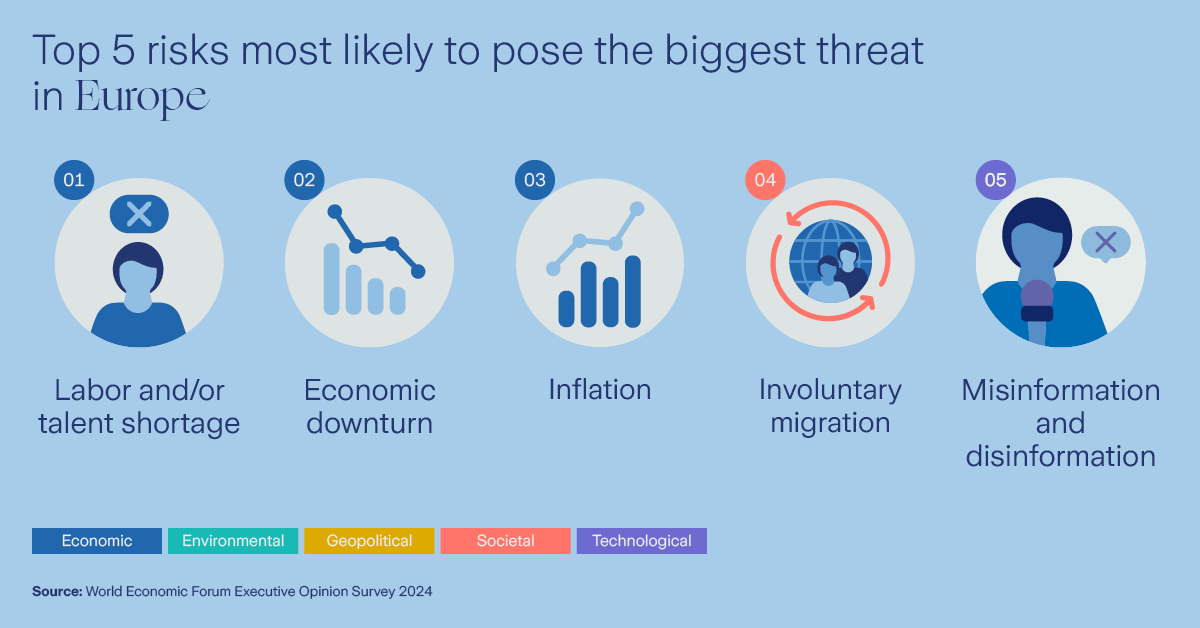Economic risks matter, but business leaders shouldn’t overlook climate threat
Global risksArticleJanuary 7, 2025
As we navigate the complexities of the modern business landscape, it’s crucial to recognize the multifaceted risks that confront us.
Labour and talent shortages top the list of concerns for thousands of business leaders in Europe, as highlighted by the latest Executive Opinion Survey 2024, conducted by the The World Economic Forum and released by its strategic partners, Zurich Insurance Group (Zurich) and Marsh McLennan. This concern underscores the pressing need for our society and business leaders to develop people with the right skills to meet the changing needs of work. Bridging this skills gap is essential to ensuring that businesses can thrive and adapt in an ever-evolving economic environment.

Navigating economic uncertainties
Economic downturn and inflation complete the top three main threats, reflecting the global apprehension among business leaders regarding economic issues. The rise of populism, nationalism and trade wars further compounds these challenges, creating an environment of uncertainty and potential disruption. The interconnected nature of our global economy means that economic and political instability in one region can quickly ripple across borders, affecting businesses and livelihoods worldwide. As business leaders, we must remain vigilant and proactive in our strategies to navigate these economic uncertainties.
Additionally, ‘involuntary migration’ emerges as the sole societal cause among the primary risks, indicating that border crises remain a persistent concern for European business leaders. The human impact of these crises cannot be overstated, and it is imperative that we find sustainable solutions to support displaced populations while maintaining economic stability.
As technology advances, so do the associated risks, with ‘misinformation and disinformation’ securing the fifth position in the survey. The rapid spread of false information can undermine trust, disrupt markets, and pose significant challenges to governance and social cohesion. It is incumbent upon us to harness technological advancements responsibly and ensure that our digital ecosystems are resilient and trustworthy.
Integrating climate resilience
Strikingly absent from the top concerns are the environmental risks. Despite recent data from the European Environment Agency showing that temperature increases in Europe are doubling global levels, environmental concerns have not made it to the forefront of business leaders’ worries. This oversight is alarming given the recent weather events that have exposed our vulnerabilities.
Climate change is not a distant threat; it is a present reality demanding immediate action. Recent floods, heatwaves and storms across Europe have disrupted businesses, destroyed homes and taken lives. The economic and human costs are staggering.
As business leaders, integrating climate resilience into our strategic planning is crucial. We must invest in sustainable practices, reduce our carbon footprint, embrace renewable energy, and build infrastructure to withstand climate impacts. Addressing these environmental challenges is not only a moral imperative, but also a strategic necessity for the sustainability and long-term success of our businesses.
In conclusion, while economic risks are undoubtedly significant, we must broaden our focus to include the pressing climate threats. By doing so, we can build a more resilient and sustainable future for our organizations and the communities we serve. Let us lead by example and show that it is possible to achieve economic prosperity while safeguarding our environment. The path forward requires bold action and unwavering commitment. Together, we can make a difference.
This article was originally published on Business leaders can't overlook climate threats | World Economic Forum




